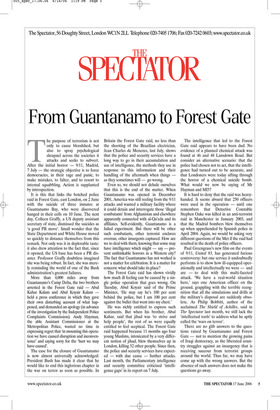From Guantanamo to Forest Gate
The purpose of terrorism is not only to cause bloodshed, but also to spray psychological shrapnel across the societies it attacks and seeks to subvert. After the initial horror — 9/11, Madrid, 7 July — the strategic objective is to force democracies, in their rage and panic, to make mistakes, to falter, and to resort to internal squabbling. Action is supplanted by introspection.
It is this that links the botched police raid in Forest Gate, east London, on 2 June with the suicide of three inmates at Guantanamo Bay, who were discovered hanged in their cells on 10 June. The next day, Colleen Graffy, a US deputy assistant secretary of state, dismissed the suicides as ‘a good PR move’. Small wonder that the State Department and White House moved so quickly to distance themselves from this remark. Not only was it in deplorable taste: it also drew attention to the fact that, since it opened, the US base has been a PR disaster. Professor Graffy doubtless imagined she was being robust. In fact, she was merely reminding the world of one of the Bush administration’s greatest failures.
More than 4,000 miles away from Guantanamo’s Camp Delta, the two brothers arrested in the Forest Gate raid — Abul Kahar Kalam and Abul Koyair Kalam held a press conference in which they gave their own disturbing account of what happened, and demanded an apology (in advance of the investigation by the Independent Police Complaints Commission). Andy Hayman, the able Assistant Commissioner at the Metropolitan Police, wasted no time in expressing regret that ‘in mounting this operation we have caused disruption and inconvenience’ and saying sorry for the ‘hurt we may have caused’.
The case for the closure of Guantanamo is now almost universally acknowledged: President Bush has made it clear that he would like to end this inglorious chapter in the war on terror as soon as possible. In Britain the Forest Gate raid, no less than the shooting of the Brazilian electrician, Jean Charles de Menezes, last July, shows that the police and security services have a long way to go in their accumulation and use of intelligence, the methods they use in response to this information and their handling of the aftermath when things as they sometimes will — go wrong.
Even so, we should not delude ourselves that this is the end of the matter. When Guantanamo was opened in December 2001, America was still reeling from the 9/11 attacks and wanted a military facility where it could detain and interrogate those ‘illegal combatants’ from Afghanistan and elsewhere apparently connected with al-Qa’eda and its affiliates. Self-evidently, Guantanamo is a failed experiment. But there will be other such combatants, other terrorist enclaves overrun, other insurgents captured. How are we to deal with them, knowing that some may have intelligence which might — say — prevent unthinkable horrors in a Western city? The fact that Guantanamo has not worked is not a matter for celebration. It is a matter for concern: what should take its place?
The Forest Gate raid has shown vividly how much ill feeling can be caused by a single police operation that goes wrong. On Tuesday, Abul Koyair said of the Prime Minister, ‘He may say he’s 100 per cent behind the police, but I am 100 per cent against the bullet that went into my chest.’ He was richly entitled to express such sentiments. But when his brother, Abul Kahar, said that jihad was ‘to strive and help people’, the rest of us were equally entitled to feel sceptical. The Forest Gate raid happened because 11 months ago four young Muslims, intoxicated by a very different notion of jihad, blew themselves up in London, killing 52 other people. Since then, the police and security services have expected — with due cause — further attacks. Last month, the Parliamentary intelligence and security committee criticised ‘intelligence gaps’ in its report on 7 July. The intelligence that led to the Forest Gate raid appears to have been dud. No evidence of a planned chemical attack was found at 46 and 48 Lansdown Road. But consider an alternative scenario: that the police had chosen not to act, that the intelligence had turned out to be accurate, and that Londoners were today sifting through the horror of a chemical suicide bomb. What would we now be saying of Mr Hayman and MI5?
It is hard to deny that the raid was heavyhanded. It seems absurd that 250 officers were used in the operation — until one remembers that Detective Constable Stephen Oake was killed in an anti-terrorist raid in Manchester in January 2003, and that the Madrid bombers blew themselves up when apprehended by Spanish police in April 2004. Again, we would be asking very different questions of the Met if the raid had resulted in the death of police officers.
Paul Greengrass’s new film on the events of 9/11, United 93, has generated furious controversy: but one service it undoubtedly performs is to show how ill-equipped operationally and intellectually we were — and are — to deal with this multi-faceted attack. ‘We have a real-world situation here,’ says one American officer on the ground, grappling with the terrible recognition that all the simulations and drills at the military’s disposal are suddenly obsolete. As Philip Bobbitt, author of the acclaimed The Shield of Achilles, said in The Spectator last month, we still lack the ‘intellectual tools’ to address what he aptly called the ‘wars on terror’.
There are no glib answers to the questions raised by Guantanamo and Forest Gate — not to mention the growing pains of Iraqi democracy, as the liberated country struggles against an insurgency that is receiving succour from terrorist groups around the world. Thus far, we may have come up with the wrong answers. But the absence of such answers does not make the questions go away.


















































































 Previous page
Previous page